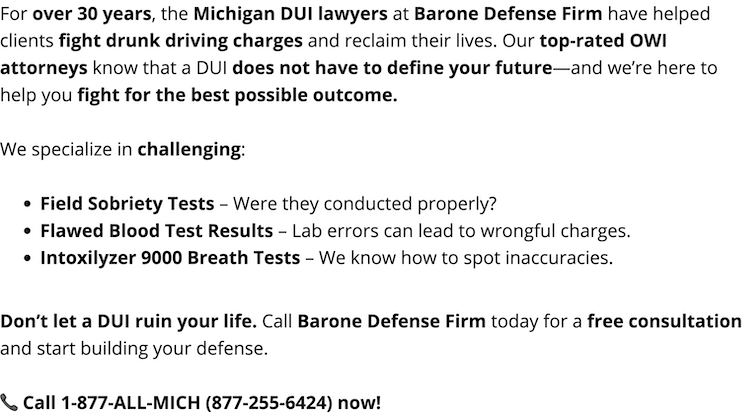Steps to Take Following a DUI Arrest
The first thing you should do after being arrested for DUI is to write down everything you can remember about your case. Sometimes the smallest or most insignificant detail can make a difference in the outcome of your case. At the Barone Defense Firm we will provide you with a questionnaire to help you in this process. Our questionnaire has been carefully created and refined over the past 30 years and contains all of the essential and useful information we will need to produce the most effective defense to your case.
Collecting EvidenceYou should also begin collecting receipts and contacting possible witnesses. Anything that can be used to prove that you had less to drink than the breath or blood test would otherwise suggest.
It is also very helpful to take photographs of the scene of the arrest, and if applicable, of your automobile. If you were hurt in an accident, by the police, or during any blood draw, photographs of the injuries you sustained will also be helpful.
Finding a DUI AttorneyIn the meanwhile, you should also begin your search for a top DUI defense specialist. To find the top DUI defense lawyer in your area, you should contact your family, friends, or other professionals that you know. Ask your CPA, and if you are divorced, and thought your lawyer did a good job, call him or her up and ask for a referral. You can even contact the court and ask the court clerks or bailiffs who they might recommend.
Internet ResearchNow that you have begun to compile a list of possible lawyers to represent you, go to the internet and begin your further research. Compare what you find on the internet to what you have been told by others. Soon top candidates will begin to emerge. You can learn a great deal about a lawyer's background and expertise by looking at their qualifications. Have they taken advanced training in the defense of alleged intoxicated drivers? Look for training in breath and blood testing, field sobriety testing, cross examination, and other trial skills. Better yet, are they asked to teach these subjects to other lawyers? What authoritative books or articles has the lawyer written? What memberships or committees does the lawyer participate in? These are some of the things to look for when comparing "apples and apples."
Don't limit yourself to just a review of the lawyer's own web site. There are many places to obtain additional lawyer information on the internet, and today there are several independent rating services for lawyers. These include sites like Avvo, Super lawyers and Martindale Hubble. Your final step should be interviewing the lawyer candidates. Speak with them in person or on the phone. Then decide.
Consider the Front and Back OfficeHow are you treated when you call the lawyer's office? Do they seem happy to talk with you and concerned about your situation, or do they rush and make you feel like you are interrupting something more important? Do they offer you a payment plan, and more importantly, do they use a standard fee agreement that explains exactly what the legal fees are and how you will be charged? Does the lawyer seem well-organized, and do they seem to have a well-run office? These are all clues that can help you look beyond what might be a carefully created but false image.
By employing each of these methods and techniques you will not only preserve essential evidence that might be critical to your defense, you all increase the likelihood that you'll find the best lawyer possible who will know exactly what to do and how to leverage all the evidence you've helped collect and preserve.
 Barone Defense Firm Home
Barone Defense Firm Home




















